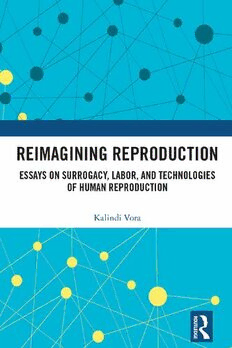
Reimaging Reproduction PDF
Preview Reimaging Reproduction
REIMAGINING REPRODUCTION This book presents an ethnographic study on gestational surrogacy in India. It frames the ethnography of the surrogacy clinic in conversation with concerns raised in the arenas of law, policy, medical ethics, and global structural inequality about the ethics of transnational assisted reproductive technology (ART) practices. Engaging ethical discourses that both advocate for and trouble the subject of reproductive rights that remains of interest in feminist studies, the volume takes up the work of critical feminist, anthropological and science studies scholarship in India, the United States, and Europe concerned with reproductive technologies. Based on fieldwork and archival sources, the volume will be of great interest to scholars and researchers of ethnography, gender, social and public policy, South Asian studies, and global public health, especially reproductive health. Kalindi Vora is Professor of Ethnicity Race & Migration, Women’s Gender and Sexuality Studies, History of Science and Medicine, and American Studies at Yale University. She is author of Life Support: Biocapital and the New History of Outsourcing, Reimagining Reproduction: Essays on Surrogacy, Labor and Technologies of Human Reproduction, and co- author of Surrogate Humanity: Race, Robots, and the Politics of Technological Futures. With the Precarity Lab, she is author of Technoprecarious. REIMAGINING REPRODUCTION Essays on Surrogacy, Labor, and Technologies of Human Reproduction Kalindi Vora First published 2023 by Routledge 4 Park Square, Milton Park, Abingdon, Oxon OX14 4RN and by Routledge 605 Third Avenue, New York, NY 10158 Routledge is an imprint of the Taylor & Francis Group, an informa business © 2023 Kalindi Vora The right of Kalindi Vora to be identified as author of this work has been asserted in accordance with sections 77 and 78 of the Copyright, Designs and Patents Act 1988. All rights reserved. No part of this book may be reprinted or reproduced or utilized in any form or by any electronic, mechanical, or other means, now known or hereafter invented, including photocopying and recording, or in any information storage or retrieval system, without permission in writing from the publishers. Trademark notice: Product or corporate names may be trademarks or registered trademarks, and are used only for identification and explanation without intent to infringe. British Library Cataloguing-in-Publication Data A catalogue record for this book is available from the British Library ISBN: 978-1-032-37907-4 (hbk) ISBN: 978-1-032-40498-1 (pbk) ISBN: 978-1-003-35336-2 (ebk) DOI: 10.4324/9781003353362 Typeset in Sabon by Apex CoVantage, LLC In memoriam: Christine Ann (Stromberg) Snell CONTENTS Acknowledgments ix 1 Introduction 1 2 Medicine, Markets, and the Pregnant Body: Indian Commercial Surrogacy and Reproductive Labor in a Transnational Frame 10 3 Indian Transnational Surrogacy and the Commodification of Vital Energy 21 4 Limits of “Labor”: Accounting for Affect and the Biological in Transnational Surrogacy and Service Work 35 5 Re-imagining Reproduction: Unsettling Metaphors in the History of Imperial Science and Commercial Surrogacy in India 53 6 Potential, Risk, and Return in Transnational Indian Gestational Surrogacy 68 7 Experimental Sociality in Transnational Surrogacy 86 vii CONTENTS 8 Citizen, Subject, Property: Indian Surrogacy and the Global Fertility Market 105 9 Conclusion: After the Housewife: Surrogacy, Labor, and Human Reproduction 120 Index 129 viii ACKNOWLEDGMENTS In Ahmedabad, my thanks to Ramesh Bhakta for offering me generous sup- port after we were introduced by our shared friend Matt Rahaim; and to Nishant Shah, in Ahmedabad and everywhere else, for animated conversa- tion and hospitality. In Rajkot: Kirit, Kanak, and Nishad Vohra, my grati- tude for always having an open door and welcoming me to be with family. In “northwestern India,” to the necessarily anonymous surrogates, doctors, staff, and commissioning parents who shared their thoughts and stories with me, I feel ongoing gratitude and responsibility to share them accurately, and I hope I’ve done them justice. Colleagues who’ve supported this work between 2008-2016 can be found across the world. My writing group at UC Berkeley in 2008-2009, including Neda Atanasoski, Kim Tallbear and Elly Teman, read and com- mented on some my first attempts at writing through this research. My first invitation to present this research was by the Barnard Feminist and Scholar conference titled, “Critical Conceptions: Technology, Justice, and the Global Reproductive Market,” through Neferti Tadiar, whose invita- tion inspired the first piece I published out of this research in their journal The Scholar & Feminist Online, included here as chapter two. Also early in this research, Sheela Saravanan invited me to speak on a panel for the 2010 European Conference on Modern South Asian Studies that she organized titled, “Reproductive Tourism in India: Ethical and Legal Concerns.” In 2011, Karen Sue Taussig and Klaus Hoeyer invited me to be a part of the Wenner-Gren symposium “The Anthropology of Potentiality,” whose powerful week long workshop and ensuing special issue of Current Anthro- pology provoked another article included as chapter six in this collection. Also in 2011, Kay Warren and the Pembroke Center at Brown invited me to present at its annual symposium in with the theme Global Relations: Kinship and Transnationalism, where I benefitted from deep conversations and productive feedback. I also received tremendous benefit from invita- tions to present this work at the UC Berkeley Center for Race and Gender conference titled, Speculative Visions of Race, Technology, Science and ix
